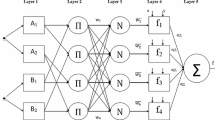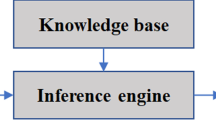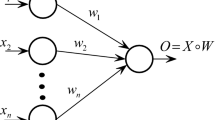Abstract
Initially, it is shown that ε-insensitive learning of a fuzzy system may be presented as a combination of both an ε-insensitive gradient method and solving a system of linear inequalities. Then, a hybrid learning algorithm is introduced. Example is given of using this algorithm for design a fuzzy model of real ECG data. Simulation results show an improvement in the generalization ability of a fuzzy system learned by the new method with respect to the traditional and other ε-insensitive learning methods.
Access this chapter
Tax calculation will be finalised at checkout
Purchases are for personal use only
Preview
Unable to display preview. Download preview PDF.
Similar content being viewed by others
References
Czogala E, Leski JM (2000) Fuzzy and neuro-fuzzy intelligent systems. Physica-Verlag, Heidelberg.
Jang JSR, Sun CT, Mizutani E (1997) Neuro-fuzzy and Soft Computing. A Computational Approach to Learning and Machine Intelligence. Prentice-Hall, Upper Saddle River.
Leski JM, Czogala E (1999) A new artificial neural network based fuzzy inference system with moving consequents in if-then rules and its applications. Fuzzy Sets and Systems, Vol.108, No.3, pp.289–297.
Leski JM (2001) Neuro-fuzzy modeling with ε-insensitive learning, Methods of Artificial Intelligence in Mechanics and Mechanical Engineering, Gliwice, pp.133–138.
Leski JM (2002) ε-insensitive learning techniques for approximate reasoning systems (Invited Paper). International Journal of Computational Cognition, Vol.1 No.1, pp.21–77.
Leski JM (2003) Neuro-fuzzy system with learning tolerant to imprecision. Fuzzy Sets and Systems, Vol.138, No.2, pp.427–439.
Leski JM (2004) ε-insensitive fuzzy c-regression models: introduction to ε-insensitive fuzzy modeling. IEEE Trans. Systems, Man and Cybernetics — Part B: Cybernetics, Vol.34, No.1, pp.4–15.
Vapnik V (1995) The nature of statistical learning theory. Springer, New York.
Vapnik V (1998) Statistical learning theory. Wiley, New York.
Xie XL, Beni G (1991) A validity measure for fuzzy clustering. IEEE Trans. Pattern Analysis and Machine Intelligence, Vol.13, No.8, pp.841–847.
Author information
Authors and Affiliations
Editor information
Editors and Affiliations
Rights and permissions
Copyright information
© 2005 Springer-Verlag Berlin Heidelberg
About this paper
Cite this paper
Czogala, T., Leski, J.M. (2005). A Hybrid ε-Insensitive Learning of Fuzzy Systems. In: Kurzyński, M., Puchała, E., Woźniak, M., żołnierek, A. (eds) Computer Recognition Systems. Advances in Soft Computing, vol 30. Springer, Berlin, Heidelberg. https://doi.org/10.1007/3-540-32390-2_15
Download citation
DOI: https://doi.org/10.1007/3-540-32390-2_15
Publisher Name: Springer, Berlin, Heidelberg
Print ISBN: 978-3-540-25054-8
Online ISBN: 978-3-540-32390-7
eBook Packages: EngineeringEngineering (R0)




